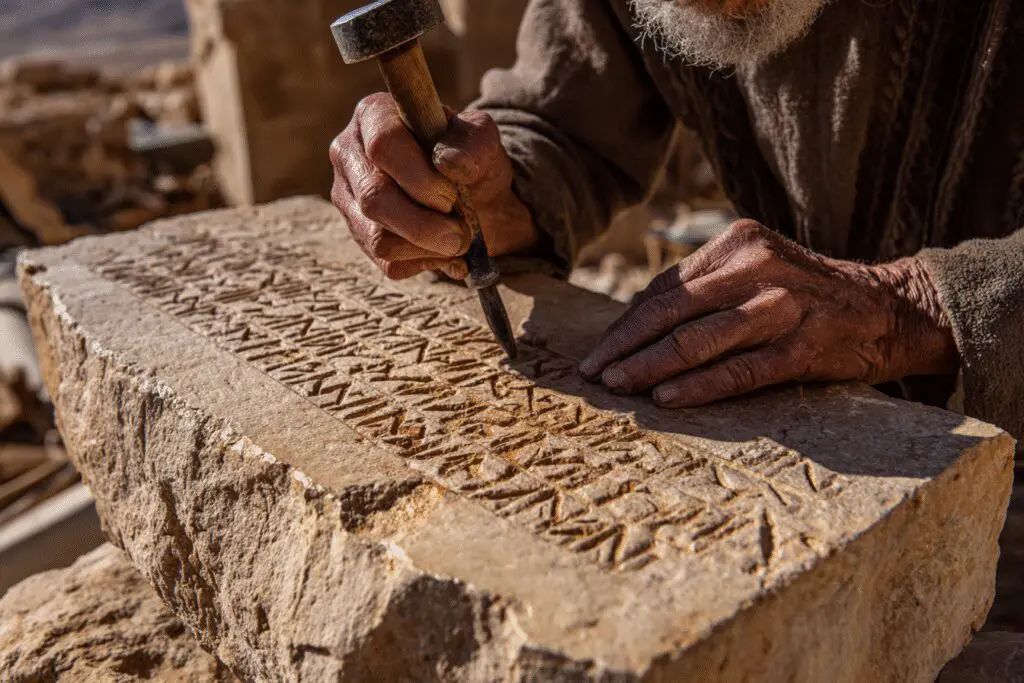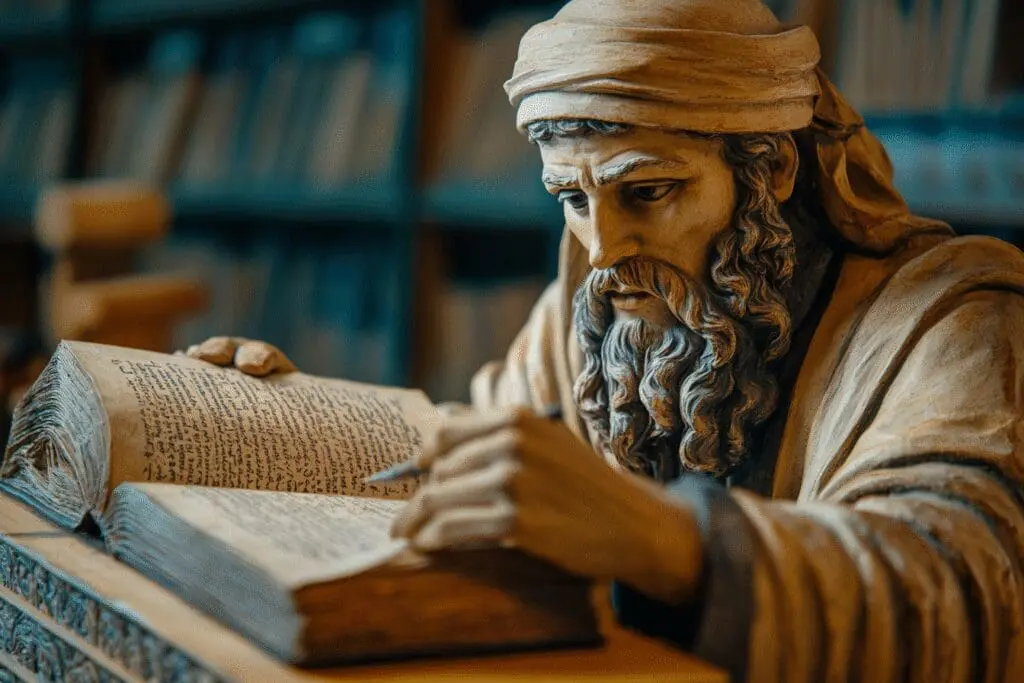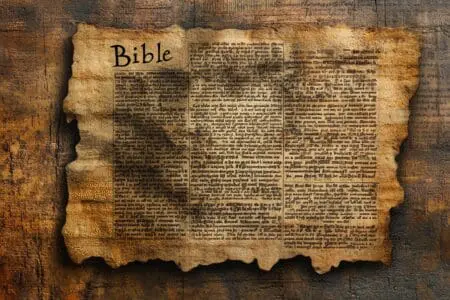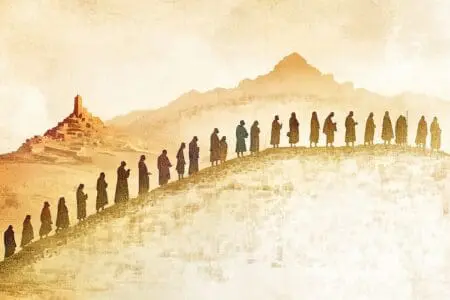Have you ever sat in a church pew or a Bible study and wondered about the hands that wrote the very first words of Scripture? It’s a huge question. For centuries, the simple answer was Moses. But is that the whole story? When we ask, “Who wrote the first five books of the Bible?” we are starting a journey into history, faith, and amazing discovery. The truth is more complex and, I think, even more fascinating than you might expect.
It’s a topic that has sparked debate for generations. You have deeply held traditions on one side. Then you have modern scholarship on the other. So, how can we, as believers, navigate this? Let’s dive in together and explore the real story behind the books of Genesis, Exodus, Leviticus, Numbers, and Deuteronomy.
More in Bible Category
What Bible Do Episcopalians Use
Key Takeaways
- The Traditional View: For thousands of years, both Jewish and Christian tradition held that Moses wrote the first five books of the Bible, also known as the Torah or the Pentateuch.
- The Scholarly View: Most modern scholars believe the books are a combination of at least four different main sources, written by different authors or schools of thought over several centuries.
- The Sources: These four sources are often called J (the Yahwist), E (the Elohist), D (the Deuteronomist), and P (the Priestly source).
- The Final Form: These different threads were likely woven together by a later editor or group of editors (called redactors) to create the final text we have today.
- Faith and Authorship: This complex view of authorship does not undermine the Bible’s divine inspiration for many Christians. Instead, it shows how God worked through many people over a long period to deliver His message.
What is the Traditional Belief About Who Wrote the First Five Books?
For as long as anyone can remember, the answer was simple and clear. Moses wrote the Torah. This belief is strong. It is rooted in centuries of faith. It’s what I was taught in Sunday school. It is what many pastors and teachers still believe and teach today.
And there’s good reason for it. The Bible itself seems to point in this direction.
Does the Bible Say Moses Was the Author?
Yes, in several places, the Old Testament mentions Moses writing things down.
- In Exodus 24:4, it says, “And Moses wrote down all the words of the LORD.” This is a very direct statement.
- In Deuteronomy 31:9, we read, “Then Moses wrote this law and gave it to the priests, the sons of Levi…”
- The New Testament also supports this. In Mark 12:26, Jesus himself refers to the “book of Moses” when discussing a passage from Exodus.
These verses create a powerful case. They have been the foundation of the belief in Mosaic authorship for millennia. For many, this is where the conversation begins and ends. If the Bible points to Moses, and Jesus refers to the book of Moses, then it seems settled.
But then, as people studied the text more and more closely, they started to notice some odd things. Things that made them scratch their heads.
Why Would Anyone Question That Moses Was the Author?
This is not about questioning faith. It is about honestly reading the text. When you read the first five books carefully, some details just don’t seem to fit with the idea of a single author writing everything during his lifetime.
Think about it for a moment.
The end of Deuteronomy describes the death and burial of Moses. It even says, “to this day no one knows where his grave is.” It also states that “since then, no prophet has risen in Israel like Moses.”
How could Moses have written about his own death? How could he have written about what happened “since then”?
This was one of the first big clues that made people think. It suggested that at least part of the text was written or added by someone else, long after Moses was gone.
Were There Other Clues in the Text?
Yes, there were quite a few. These were not mistakes. They were more like different fingerprints left on the pages of the Bible.
- Different Names for God: In some parts of Genesis, God is called “Yahweh” (often translated as LORD in all caps). In other parts, He is called “Elohim” (translated as God). Sometimes, the names are even used side-by-side. This switching feels like different writers might have preferred different names for God.
- Stories Told Twice: Did you ever notice there are two different stories of creation in Genesis? Genesis 1 gives us the grand, seven-day account. Then, Genesis 2 gives a more personal, garden-focused story. They are not the same. Similarly, there are details in the story of Noah’s Ark that seem to be doubled. In one part, Noah is told to take two of every animal. In another part, he’s told to take seven pairs of the clean animals.
- Different Writing Styles: Some parts of the Torah are vivid, earthy stories. God walks in the garden. He speaks face-to-face with people. Other parts are very formal. They focus on laws, rituals, and genealogies. The tone and style can change very quickly. It feels like switching between a master storyteller and a legal expert.
These clues led scholars to a new idea. What if the first five books weren’t written by one person? What if they were carefully woven together from several older documents?
This idea is known as the Documentary Hypothesis.
What is the Documentary Hypothesis?
Okay, the name sounds complicated. But the idea behind it is pretty straightforward. It’s the most widely accepted theory among biblical scholars today about who wrote the first five books of the Bible.
The hypothesis suggests that the Pentateuch is a combination of four main sources. These sources were written by different people at different times in Israel’s history. Later, a brilliant editor, or a group of editors, combined them into the single, flowing story we have now.
Imagine you have four different history books about the founding of America.
- One is a collection of personal stories from the soldiers.
- Another is a legal text with all the new laws.
- A third is a passionate speech about freedom.
- A fourth is a book of official records and dates.
Now, imagine someone carefully cutting and pasting parts from all four books to create one single, grand history. You would get the whole picture. But if you looked closely, you could still see the different original styles.
That’s the basic idea behind the Documentary Hypothesis. Scholars have given labels to these four sources.
What Is the “J” Source? The Yahwist
This is believed to be the oldest source, maybe written around 950 B.C. in the southern kingdom of Judah.
- Name for God: This writer consistently uses the name “Yahweh” for God, right from the beginning of Genesis. That’s why it’s called J (from the German spelling, Jahwe).
- Style: The J source is a master storyteller. The writing is vivid, personal, and full of drama.
- Picture of God: God is very personal and human-like in J. He walks in the Garden of Eden. He shuts the door of Noah’s ark. This is called an anthropomorphic view of God.
- Key Stories: Many of the most famous stories in Genesis, like the Garden of Eden, Cain and Abel, and the Tower of Babel, are thought to come from J.
What is the “E” Source? The Elohist
This source is thought to have been written a bit later than J, maybe around 850 B.C., in the northern kingdom of Israel.
- Name for God: This writer uses the name “Elohim” for God. The name Yahweh is not revealed until the story of Moses and the burning bush in Exodus.
- Style: The E source is also a good storyteller, but a bit less personal than J.
- Picture of God: God is more distant in the E source. He speaks to people through dreams, visions, and angels, rather than face-to-face.
- Key Stories: Parts of the stories of Abraham, Jacob, and Joseph are thought to come from E. The story of Abraham almost sacrificing Isaac is a powerful example of E’s style.
What is the “D” Source? The Deuteronomist
This source is very different. It is found almost entirely in the book of Deuteronomy. It was likely written much later, perhaps around the time of King Josiah’s reforms in 621 B.C.
- Name for God: Uses Yahweh.
- Style: The D source is written like a series of powerful sermons. It is filled with passionate speeches urging Israel to be faithful to God and His laws.
- Main Message: The core message is about covenant. If Israel obeys God’s law, they will be blessed. If they disobey, they will be cursed. There is a strong emphasis on worshipping God in one central place, the Temple in Jerusalem.
- Key Content: Almost all of the book of Deuteronomy comes from this source.
What is the “P” Source? The Priestly Writer
This is believed to be the last of the four sources. It was probably written by priests during or after the exile in Babylon, maybe around 550-450 B.C.
- Name for God: Prefers “Elohim” in the early stories, similar to E.
- Style: The P source is very formal, organized, and precise. It is not interested in dramatic stories as much as it is in order, law, and proper worship.
- Main Focus: P is all about things that would be important to priests. This includes genealogies (family trees), covenants, laws about diet and purity, religious festivals, and the details of the tabernacle.
- Key Content: The first creation story in Genesis 1 is from P. So are the detailed laws in Leviticus and the long lists of names and numbers in the book of Numbers. P provides the structure and framework for much of the Torah.
You can learn more about the academic study of these sources from educational institutions. For example, Yale University offers online courses that explore the composition of the Hebrew Bible in great detail. You can find resources on their Open Yale Courses website.
How Were All These Sources Put Together?
So, if there were all these different documents floating around, how did they become the Bible we know? This is where the final step comes in.
Most scholars believe that a final editor, or group of editors, took these four sources (J, E, D, and P) and masterfully wove them together. This person is often called “the Redactor.” This process probably happened sometime after the Babylonian exile, maybe around 400 B.C.
This editor’s goal was not just to copy and paste. The goal was to create a single, unified story for the people of Israel. This story would tell them who they were, where they came from, and what their relationship with God was all about.
The editor did an amazing job. The seams are often hard to see. But by blending the epic stories of J, the moral lessons of E, the passionate sermons of D, and the orderly structure of P, the editor created a work far greater than the sum of its parts.
So, What Does This Mean for Our Faith? Does This Destroy the Bible?
This is the most important question. When I first learned about this theory, it was a bit of a shock. It felt like someone was trying to take the Bible apart. It can feel like it challenges the idea that the Bible is the inspired Word of God.
But after a lot of thought and prayer, I have come to see it differently. In fact, I believe this understanding can make our faith even richer. Here is why.
God Worked Through a Community, Not Just One Man
The Documentary Hypothesis shows us that God’s Word was not just dropped out of the sky into one person’s lap.
Instead, God worked through a whole community of believers over many centuries. He inspired storytellers, prophets, priests, and editors. Each one added their unique voice to the choir, all singing one grand song about God’s love and redemption.
This shows a God who is patient. A God who is deeply involved in the long, messy story of His people. The Bible becomes a living testament to a community wrestling with God over generations. That, to me, is beautiful.
It Explains the Bible’s Richness and Variety
This theory also helps us appreciate why the Bible feels the way it does. It’s why we have both grand, cosmic poetry (like Genesis 1 from P) and deeply personal, earthy stories (like the Garden of Eden from J).
God gave us both. He gave us the law and the stories. He gave us the genealogies and the passionate sermons. He knew we needed all of it to get the full picture of who He is. We can appreciate each part for its unique style and message, knowing it contributes to the whole.
Our Faith is in God, Not a Theory of Authorship
Most importantly, our Christian faith does not rest on who physically held the pen. Our faith rests on the person and work of Jesus Christ.
Jesus is the ultimate Word of God (John 1). The Old Testament, in all its complexity, points to Him. The message of the Torah is about creation, fall, redemption, and covenant. This message is true and life-changing, no matter how it was assembled.
Knowing that the Torah might have multiple authors doesn’t change the Ten Commandments. It doesn’t change God’s promise to Abraham. And it certainly doesn’t change the story of God rescuing His people from Egypt. The divine truth of the message shines through.
Conclusion: A More Amazing Story
The journey to answer this question takes us from a simple, traditional answer to a more complex and detailed one.
The tradition says Moses. And he was without a doubt the great lawgiver and foundational leader. His spirit and teachings are all over the Torah.
But a closer look at the text itself suggests a different story. A story of at least four great sources, woven together over time. A story of the vibrant J, the reflective E, the passionate D, and the orderly P.
This doesn’t have to be a problem for our faith. It can be an invitation. An invitation to see the Bible as a more complex, more human, and more divinely intricate book than we ever imagined. It shows God working through history, through community, and through different voices to create one unified masterpiece.
The truth is, the story of the Bible’s authorship is as epic as the stories it tells. And it reminds us that God’s ways are often bigger and more mysterious than our simple answers can contain.
Frequently Asked Questions – Who Wrote the First Five Books of the Bible

Is the Documentary Hypothesis considered the final answer on biblical authorship?
No, it’s one of the main scholarly ideas, but debates continue, and some experts suggest there may be more sources or that editors played a significant role in shaping the final texts, reflecting ongoing discussions in biblical studies.
How do scholars identify different authors or sources within the Bible?
Scholars look for stylistic differences, variations in the names for God, historical references, and distinct themes or perspectives to identify different writers or sources within the texts.
What is the Documentary Hypothesis?
The Documentary Hypothesis is a scholarly theory that suggests the first five books of the Bible are a compilation of at least four different sources or writings, known as J, E, D, and P.
What are some clues that suggest the Bible’s authorship is more complex than Moses?
Clues include the story of Moses’ death at the end of Deuteronomy, anachronisms like references to the Philistines, and different writing styles and names for God found in the texts, indicating multiple authors over different times.
Who was traditionally believed to have written the first five books of the Bible?
Traditionally, it was believed that Moses authored the first five books of the Bible, which are Genesis, Exodus, Leviticus, Numbers, and Deuteronomy.




